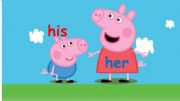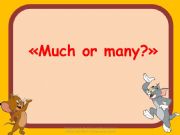
SO or SUCH
The usage of SO and SUCH with adjectives, adverbs and nouns.Hope it will be useful.Thanks for downloading in advance!
Level: elementary
Age: 12-17
Type: worksheet

A Quick QUIZ: BRITISH WORD OR AMERICAN WORD?
A quick quiz, with the KEY!
Level: intermediate
Age: 10-17
Type: worksheet

Have got - Has got / How many - How much?
Exercises to practise �have got - has got� and �how many - how much?�
Level: elementary
Age: 10-17
Type: activity-card

CAN OR CAN�T ? MATCHING ACTIVITY - FULLY EDITABLE
Can you match AND complete the sentences and pictures? Some pictures DO not have a match. Write the sentences.
See my other worksheet for more game options:http://www.e slprintables.com/pri ntable.asp?id=466992 #thetop
Level: elementary
Age: 8-10
Type: worksheet

Must/mustn�t
Hi !This is my last contribution ,here to practise must or mustn�t for this school year, the pupils are leaving at the end of the week and I MUST have a holiday now. Thanks Mada for the template
Hope you will like it , thanks for your nice comments and enjoy your holidays too, bye!:))))Sylvie
Level: elementary
Age: 8-14
Type: worksheet

Adverb or Adjective
Revise adverb and adjective with your students - 2 pages and key
Level: elementary
Age: 12-17
Type: worksheet

fruit or vegetables
pupils are asked to label the fruit and vegetables, then put the f/v under the correct heading
finally they are asked some questions about their favourite fruit/vegetables
Level: elementary
Age: 3-9
Type: worksheet

MUCH or MANY ?
Practice, practice, practice - is the key to success!!! This activity-card includes 50 sentences,which students have to correctly supply with MUCH or MANY. Nice one for revising countables / uncountables.
Level: intermediate
Age: 9-17
Type: activity-card

There is/ isn�t - There are /aren�t - a / an - some / any (2 / 3)
Part 2 of my flashcards to practise food words, use of there to be and some - any. Enjoy!!!!
Level: elementary
Age: 7-17
Type: flash-card

must-mustn�t
3 different exercises with must-mustn�t.hope it�s useful.
Level: elementary
Age: 7-17
Type: worksheet

SOME & ANY
HELLO! THIS IS A WS THAT CAN BE USED FOR BOTH TEACHING-PRACTISING AND REVISING SOME AND ANY. IT INCLUDES MANY SENTENCES AND A SPEAKING ACTIVITY. I HOPE YOU LIKE IT! MY STUDENTS LOVE ESPECIALLY THE FINAL PART!
Level: elementary
Age: 8-17
Type: worksheet

Past perfect or simple past
Practice the difference between past perfect and simple past. You have two grammar examples and different exercises. Key included.
Level: intermediate
Age: 12-17
Type: worksheet

simple present, present continuous or simple past.
Use the verbs in parentheses in the correct form: simple present, present continuous or simple past.Complete the sentences with the correct forms of the verbs in the box: simple present, present continuous or simple past.
enjoy /catch / spend / forget / push / buy /come /whisper /interview / put /make / need / meet / leave / chat
Level: elementary
Age: 10-14
Type: worksheet

BEEN OR GONE
The differences between been and gone. hope to be useful for everbody...
Level: elementary
Age: 10-17
Type: worksheet

PRESENT CONTINUOUS OR PRESENT SIMPLE?
WORKSHEET TO KNOW THE DIFFERENCES BETWEEN PRESENT CONTINUOUS AND PRESENT SIMPLE
Level: intermediate
Age: 11-17
Type: worksheet
|

English and American Culture Quiz 2
A contest to test how much students know about the sports, people and geography of UK and USA. There are 30 questions in total. It can be used as a competition game for different groups of students.
Level: intermediate
Age: 11-17
Format: PowerPoint

Family Feud Quiz 3
You�ve certainly seen the program. In the US its called Family Feud, in the UK its Family Fortunes, but the format is the same. Two families play against each other. The questions are not necessarily difficult but can be tricky.
The technique is to work out, not what you necessarily think the answer is, but what the top answer given by a group o...
Level: intermediate
Age: 10-17
Format: PowerPoint

True or False animal facts quiz
Level: intermediate
Age: 10-100
Format: PowerPoint

Which English do you speak? American British
Presentation designed to show some of the differences between American and British English
Level: intermediate
Age: 12-100
Format: PowerPoint

Allowed or forbidden ?
A slideshow to practise what is allowed or forbidden to wear at school. Your students will enjoy it for sure !
Level: intermediate
Age: 12-17
Format: PowerPoint

False cognates or false friends
Some theory and funny photographs illustrating the wrong use of false cognates.
Level: intermediate
Age: 13-100
Format: PowerPoint

his or her
his or her
Level: elementary
Age: 5-10
Format: PowerPoint

Fruit or vegetable
A simple Powerpoint I used to practice fruit and vegetable vocabulary.
Level: elementary
Age: 7-12
Format: PowerPoint

Compound adjectives and Conjunctions
Students fill in the gaps with the right conjunction.
* neither nor
* either or
* not only but also
* both
They also practice some vocabulary related to compound adjectives.
Level: intermediate
Age: 11-100
Format: PowerPoint

Much or many
Pupils should choose much or many
Level: elementary
Age: 8-12
Format: PowerPoint

Adjecttives to describe objects or places (2/3) bad characteristics
I created these flashcards to introduce new vocabulary to my students, these flashcards can be used along with my printable: A terrible holiday! (Reading exercise)
http://ww w.eslprintables.com/ send_printables/edit printable.asp?id=128 353
Students learn how to describe bad characteristics in places or objects.
There are 3 sets. This is the sec...
Level: elementary
Age: 14-17
Format: PowerPoint

Present Simple or Present Continuous?
The presentation contains some exercises and coloful animated pictures for using Present Simple and Present Continuous. I hope it will be useful
Level: elementary
Age: 3-12
Format: PowerPoint

Strategies in Interactive Language
Tips to keep in mind as professors
Level: advanced
Age: 14-17
Format: PowerPoint

there is-there are
There is- there are with count and non count nouns.Pictures and examples using some and any.
Level: elementary
Age: 11-17
Format: PowerPoint

RULES AND REGULATIONS
SS CAN INTERPRETATE WARNING SIGNS FROM DIFFERENT COUNTRIES, WHEN DO THEY HAVE TO USE MUST, MUSTN�T, HAVE TO, HAS TO, IDENTIFY, SCHOOL RULES, SET OF INSTRUCTIONS, WARNING SIGNS, HOUSE RESPONSABILITIES.
Level: intermediate
Age: 11-14
Format: PowerPoint
|
|